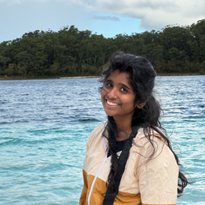
Rojashree Jayakumar
University of Sydney
Hi, I am Rojashree, a PhD student in the School of Mathematics and Statistics in University of Sydney supervised by Dr. Shila Ghazanfar and Professor Jean Yang. I have completed my master’s in bioinformatics from Boston University in 2023 and had worked as a bioinformatics analyst, where I was involved in analysing transcriptomics datasets in neurological disorders before starting my PhD in Australia. My research interests are in developing deep learning and statistical methods for analysing biological datasets.
Can you describe the area of mathematics or bioinformatics you’re focusing on, and what you hope to achieve through your research?
I focus on developing methods for cell communication using spatial transcriptomics data. Cells communicate with each other to perform function which is important for normal living and these communications are disrupted in disease. Further cell communication pathways can be targeted by drugs and hence play an important role in drug discovery. In spatial transcriptomics, in addition to transcriptomic information at the level of a single cell, there is also spatial information which provides further biological insights. Hence, I hope to develop methods for cell communication using spatial transcriptomics datasets.
What inspired you to pursue a career in bioinformatics or the mathematical sciences?
I always liked mathematical sciences from school and hence I wanted to pursue a career which had a major mathematical background. I discovered about bioinformatics when I worked as an analyst in genomic company called MedGenome, where I met many professional bioinformaticians. I was inspired by their ability to process and understand complex data.
If you could give advice to your younger self, what would it be?
I think its best to follow your passion when it comes to choosing a career. This is because I did pure biology in my undergraduate and I dint like it and I switched to bioinformatics which I enjoyed because I was very passionate about mathematics and bioinformatics and coding. Mathematical sciences are complex but they are very enjoyable.
How was your AMSI BioInfoSummer experience?
I enjoyed AMSI BioInfoSummer because I learnt a lot from the talks and workshops. I was motivated to attend to broaden my knowledge in bioinformatics. In short, AMSI BioInfoSummer, connects students with each other, provides learning opportunities through invited talks and hands-on workshops.
You received an AMSI BioInfoSummer travel grant to attend in person. How did this grant impact your ability to participate fully?
If I did not get the grant, I would not have been able to interact with fellow pears across Australia and exchange research ideas. I especially did this during the Poster sessions, which would have not been possible in a virtual event.
What was the most valuable experience or takeaway from AMSI BioInfoSummer?
My most valuable experience was I learnt in depth about Large Language models and other concepts such as transformers which are very important for my research.
Where do you see your journey in mathematical sciences taking you in the next 5–10 years?
Yes, AMSI introduced me to new opportunities and ideas. The talk by Dr. Megan Coomer, where she talked about her transition from academia to owning her own startup was very inspiring and had introduced me to potential new pathways outside academia. In the future I see myself working in the Research and Development departments in industry to make a positive impact.
Is there anything else you’d like to share about your experience or feedback on AMSI BioInfoSummer or the travel grant?
I would like to share that every first year PhD student needs to attend a conference such as AMSI because it provides in depth learning opportunities and research ideas from peers which is very beneficial in the long run
